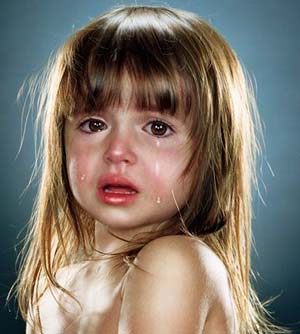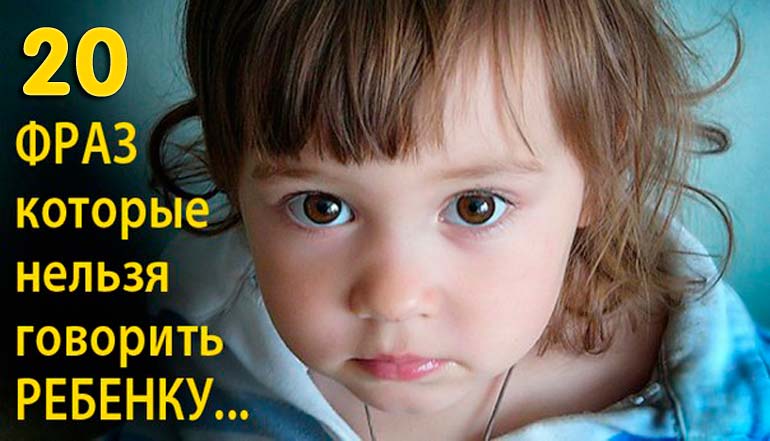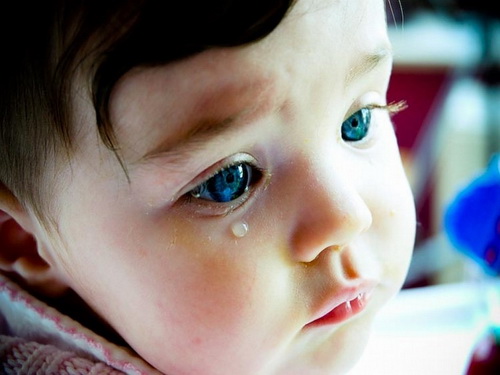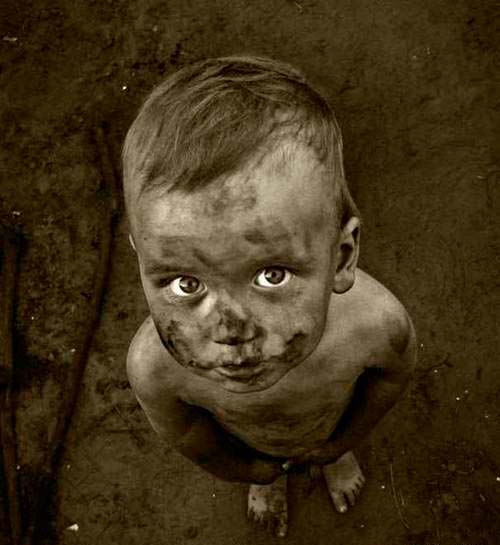Many "educational" phrases with us, parents, fly out just on the machine. We heard them from our parents, and now our children hear them from us. Without trying to “filter” our speech, we can cause significant harm to the child, because all our intimidations, reproaches and warnings will forever remain a “voice in his head”, which at the most inopportune moment can lead a person astray, forcing him to abandon something important and significant in his life. Let’s try to figure out what the child is “programmed for” and what the well-known parent words lead to.
1. “If you don’t obey, I will give you to a neighbor”, “If you don’t sleep, the gray wolf will take you”, “If you run away, the evil uncle will take you and take you with him”
Different situations, different phrases, but one thing is to frighten the child in order to achieve obedience. It works flawlessly, because the worst thing for a child is to be separated from his mother, but has a significant “side effect” - from these horror stories a child can simply develop a neurosis. Such words do not teach the child to understand why it is dangerous to run away or not to obey mom - they just inspire fear. Frightening a child with grandmothers, evil uncles and other characters, we can make him a neurosthenic who will be scared of any rustle, but will not understand what needs to be done to avoid danger. It is better to explain to the child why he should do something, and what will happen if he does not.
2. “If you eat badly, you won’t grow up (you’ll be weak, girls will not love, etc.)”
This is the same horror story, because again we are trying to frighten the child with some bad consequences from his actions. If you want to instill in your child a habit of healthy food and a diet, find something that will really motivate, not intimidate. As an option: tell stories about heroes who defeat villains only because they eat healthy porridge in the morning, or set an example for a strong and courageous dad who never refuses a delicious dinner.
3. “You will make faces - you will forever remain with that face”, “If you pick your nose, you will break your finger”
Children are children and that is to make faces and be mischievous, but sometimes this is sometimes not at all appropriate, therefore, such habits must be gently corrected. It is completely pointless to intimidate a child with something that will never happen in life, so we choose a different tactic: we tell the child why it is not right to rage, make faces and pick your nose. For persuasiveness, you can tell that real heroes grow only from obedient and diligent kids, and as an example, you can call positive characters from your favorite cartoon.
4. “Well, what are you so awkward, always breaking everything”, “Do not meddle, I will do it myself”, “Your hands are inserted with the wrong end”
According to parents, this rude criticism is designed to help the child become independent, learn how to do something on his own, not break or spoil things.Understand: breaking a new toy, spilling milk or breaking a plate, the child really wants to learn independence, but he is still too small and he needs help. When in response to his actions he hears such things, on the contrary he gives up: why do something, if I do it badly anyway and my mother scolds me. From these children then grow apathetic and uninitiated adults who, in all seriousness, consider themselves incapable losers and do not even take up business. Instead of criticism and censure, parents need patience and a desire to help when a child asks for it - the rest will come by itself.
5. “Vanya has already eaten porridge, but you are still digging around”, “Everyone has normal children, and you are forever ...”, “Aunt Masha Petya is studying for fives, but you ...”
Such phrases will never induce the child to tighten his studies or achieve something, because for the child they are a sign that parents love him not by themselves, but for his achievements. Comparing children is generally not effective: all children are different, with different abilities and capabilities. A child can maximize his talents only when he is sure that he is loved and accepted by anyone: slow, unsportsmanlike, with triples in his diary. It is on this acceptance and support that we must emphasize. Otherwise, self-esteem falls, the child can become isolated and dislike the object of comparison.
6. "You are the best with us," "From your class, no one is even good for you"
It’s clear that for any parents their child is the best, but to be the best and most beloved for mom and dad and to be better than all other people are two different things. Someone will object: “But you have to praise the child ?!” It is necessary, but such statements are not praise, but simply empty praises that give rise to a "star disease" in the child. Meanwhile, he will live in a world where no one will admire him and consider him the best. Starting from school, a child is evaluated: first, teachers, then teachers at a school or university, then a potential employer. None of them will express violent enthusiasm and consider a grown-up child unique, irreplaceable and the very best. In addition, the child is also not stupid, and if he understands that he is objectively “losing” to someone in something, such statements will only give rise to disappointment: mom and dad lie to me, I'm not the best. If you want to praise, you need to praise for specific deeds and actions ("You are so good that you wrote a control for the top five"), and it is better to say that the best child is only in the context of the fact that he is the best for mom and dad.
7. “Until you sing, you won’t go for a walk”, “Until you collect toys, I won’t turn on cartoons”
Until a certain point, an attempt to “bargain” with a child will bear fruit in the form of the desired behavior. But children grow up and learn, first of all, from their parents. At an older age, the child will begin to “bargain” with his parents in the same way: I will study if you buy a new phone, wash the dishes, if you let go for a walk, etc. The service-for-service tactic generally distorts the child’s idea of why certain things should be done: for example, toys must be assembled so that the room is in order, and not so that mom will have mercy and turn on the cartoon, but with such tactics the child will not learn this. If a child should or should not do something, then you just need to explain your position, and not bargain with the child for the necessary behavior in exchange for concessions and permissions.
8. “I will not go anywhere with such a grimy child,” “I will not love you so harmful”
As usual: the goal is obedience and the right behavior, but here is a remedy from the category of mutilating life. The fact is that the child needs confidence in mother's love without any conditions. Such phrases say the opposite: they love a child, but only good, obedient, calm, clean, etc. It turns out that the task of the child in this case is not to be himself, but to meet parental expectations.And where do you order the child to give his other no less natural manifestations: whims, tears, discontent? All this goes into self-doubt, fears and resentments that the child will carry through his whole life.
 9. “Why did I give birth to you at all”, “It would be better if we had a girl / boy”
9. “Why did I give birth to you at all”, “It would be better if we had a girl / boy”
Most often, such phrases fly out in moments of intense anger, when parents can not cope with their emotions. For a child, these are very scary words, because at that moment the parents reject him at the level of existence, giving the message: “It would be better if you weren’t”. Living with such a load is simply unbearable for a child, because for him parents are his whole world, and this world does not seem to need him.
10. “I didn’t make a career because of you”, “If it weren’t for you, we would have a rest every year at sea”
Of course, the child greatly changes the life of the family and the priorities of the woman, but the child himself is not to blame for the fact that his appearance violated someone's plans. You are an adult and you are responsible for your life, and not a defenseless and dependent creature. Such phrases “reward” the child with a burden of responsibility for the life of parents and feelings of guilt, for their unfulfilled dreams and plans.
11. “It doesn’t matter to you what you want there, do as I said,” “Who asks you at all,” “I said so, so it means”
Not the most successful attempt to show firmness of will and character. Such orders without trying to discuss and hear the opinion of the child are very severe pressure, and the greater the pressure, the stronger the resistance. Insisting on your own, always explain to the child why this should be so, and sympathize if his wishes do not coincide with the need to do something, but sometime just let the child make his choice - so he learns to decide what he needs, and argue their position. Otherwise, extremes can await you: from a weak-willed person, unable to decide anything, because his mother always decided everything for him, to a desperate rebel who, in any situation, “bends his line” and does not hear anyone.
12. “How you exhausted me, the pressure must have risen”, “You’re so screaming that my head is cracking from you”, “If you behave like that, I’ll get upset and get sick”
These phrases are an attempt to play on the fear of the child to lose mom. Manipulating this fear is very dangerous, because in this way you appoint the child responsible for his life and health. In this situation, if something really happens to you, the child will live his whole life with the belief that this happened through his fault. If you need to reassure the child - methodically explain to him why you can not scream, stomp, knock, throw the ball at home, etc. This will require more effort and time, but will not harm or injure the child.
13. “It’s better not to catch my eye”, “Disappear so that I don’t see you here at all”
With these phrases you also reject the child, and for him it is very scary and painful. When you can’t cope with your emotions, act as if you crash the plane: first you need to put on the “oxygen mask” on yourself, and only then deal with the child. Your “oxygen mask” may be going to another room, slow counting to 10, a sip of water, that is, something that will return you to a normal state in which you definitely will not say such things.
14. "Yes, take it, just leave me alone"
If there are any prohibitions for a child, they should be "iron". Similar phrases sound when the mother resisted for a long time, and then surrendered, if only the child was behind. At this moment, the baby begins to understand: "If you can’t, but for a long time asking or crying plaintively, then you can." For a child, this means that any prohibition can be broken by certain efforts, and you yourself dig this hole of manipulation and shattered prohibitions.
15. “Once again you do this - you won’t see cartoons anymore”, “Once again you say such a word - you’ll be left without walks”
The main problem in trying to punish a child by depriving something is that these threats often do not come true. So, after a couple of such cases, the child will not even react to these words: anyway, the mother will not do anything. Either keep your word (but then choose a punishment appropriate to the situation), or do not shake the air in vain.
16. “Now calm down”, “Well, quickly shut up!”, “Stop normally”
These rude shouts are more reminiscent of the elements of training, rather than communication with your beloved child. Even a small child is already a person who needs to be respected, and communication in this tone is not associated with respect in any way. Keep in mind that every rude word spoken to a child will come back to you in the future with even greater rudeness and neglect.
17. "Found because of what to roar, what nonsense!", "Well, that you dismissed the nurse because of a trifle"
Adults and children look at things differently, so trifles can really be a tragedy for a baby. With these phrases you devalue his feelings and show that his problems seem ridiculous to you. At the same time, the child does not receive understanding and acceptance, remains unheard and learns to hide his true feelings: anyway, there is no one to pour them out.
18. “I won’t buy you anything, I don’t have money”
 A shopping trip is often accompanied by different “buy” by the child, and adults often stop this begging with the phrase “no money”. A child can only endure from this situation that his parents are losers who cannot buy anything for him. It is better to teach a child to control his desires not by the lack of finances, but by the understanding that, for example, a lot of sweet is harmful, and buying another transformer when there are already 10 of them is not reasonable. To do this, their refusals must be logically explained, and not brushed aside by the phrase "there is no money."
A shopping trip is often accompanied by different “buy” by the child, and adults often stop this begging with the phrase “no money”. A child can only endure from this situation that his parents are losers who cannot buy anything for him. It is better to teach a child to control his desires not by the lack of finances, but by the understanding that, for example, a lot of sweet is harmful, and buying another transformer when there are already 10 of them is not reasonable. To do this, their refusals must be logically explained, and not brushed aside by the phrase "there is no money."
19. “Don’t think up, nobody is there”, “Stop crying, there’s nothing wrong in the dark”
Children have a wild fantasy, so there are always some fears: rustlings, shadows, darkness, monsters under the bed and women in the closet. These fears are normal feelings of the child, which are important to accept, not ignore. Calm the baby, check and make sure with it that there is nothing to fear. Fending off the child and even scolding him for his fears, you only push him to not share anything and keep everything in himself. Sometimes unexperienced childhood fears turn into serious phobias that will poison life even in adulthood.
20. “Oh, how rude you are,” “Oh, you greedy,” “Oh, how dirty you are, like a pig”
All these phrases are negative evaluative in nature, for the child is the message "I'm bad." In general, condemning a child for some imperfections is very strange, because he is the way you educate him. If you want the child to grow up cultural, generous and accurate, teach him this yourself, show how to behave, and not criticize.
We also read:
What words can not be said to children. The scariest phrases that a child can hear from parents. How words affect children -https://kid.htgetrid.com/en/psihologiya-detey/kakie-slova-luchshe-ne-govorit-detyam.html
The 5 most unfair and offensive phrases from parents that children can hear -https://kid.htgetrid.com/en/psihologiya-detey/5-samyih-nespravedlivyih-i-obidnyih-fraz-ot-roditeley-kotoryie-mogut-uslyishat-deti.html
15 phrases that a child should hear daily from mom and dad - https://kid.htgetrid.com/en/psihologiya-detey/15-fraz-kotorye-rebenok-dolzhen-slyshat-ezhednevno-ot-mamy-s-papoj.html
Many of these phrases seem harmless and even useful, but now we see how they affect the child and what results they can lead to. It is not easy to get rid of the habit of telling a child all these things, but if you realize their harm and make an effort, you can eradicate these educational cliches from your speech and thereby rid the child of mental trauma.













I felt ashamed, almost half of the sentences I say to my child. I never insult him, but I love to frighten him, she doesn’t want to listen differently. Until he hears, now the wolf will come, he doesn’t want to eat at all!
I believe that some of the above phrases can be used, but there are five of them in strength. A child, no matter how obedient and smart he is, still does not quite control his behavior, is aware of what he has done, and sometimes there is no choice but to intimidate him.
Yes, indeed, very often parents do not even think about what effect this or that said phrase has on the child. Few people try to understand how the baby’s psyche is formed, admitting their negative impact on its development. Often I encounter a very formal attitude towards my children .. I want to believe that the literacy of parents in matters of psychology will gradually increase.
I remember when I was little, I was told such phrases. Nothing happened to me, I still love my parents.
The author, but then what to say to the child in order to achieve obedience? Many of these phrases are nothing terrible. I am not a psychologist, but it seems to me that the phrase: if you don’t wash it, I won’t go anywhere with such a grimy one - it’s quite logical.
Half of the sentences I say, well, really, if you remove everything? Yes, damn it, I can only feed my boys so intimidating)) otherwise they will not eat. As they wrote above, in childhood I heard all these phrases, I love my children, I love my mother))